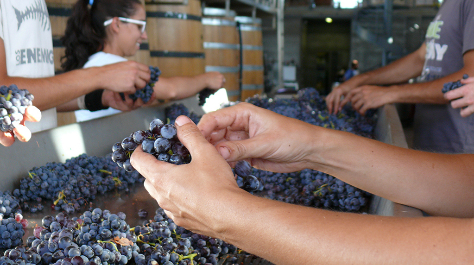- Tourism: The 10 most beautiful (and unknown) towns in Spain
- Getaway Granada: everything you cannot miss in the city of the Alhambra this summer
The coronavirus pandemic has changed many habits, mainly due to the social distancing measures necessary to avoid infections. It has also had an impact on travelers, who look more than ever at national destinations to spend their vacations. In this new normal, Manuel Romero, director of Dinamiza Asesores, a consulting firm specialized in the sector, highlights the value of gastronomy "beyond being a driving force for tourists ." Now, he explains, it plays a fundamental role in the image, positioning and competitiveness of destinations, so "no one should ignore the development of their gastronomic offer if they want to achieve excellence and attract quality tourism."
"This Covid-19 crisis is going to lead to some changes in tourists, who will want to travel and discover destinations in a more leisurely way, savoring every moment, every place," continues Romero. In his opinion, travelers will choose nearby destinations, places that they already know and that, therefore, give them confidence. "We will want to go further, discover its essence, authenticity, ways of life and the most authentic gastronomy of each region," he explains.
Exactly for this reason, he believes that it is an opportunity for many destinations that have not yet taken advantage of all their resources, since gastro tourism "is much more than eating in restaurants or organizing an event."
GASTRO TOURISTS: 82% OF SPANISH
According to the III Study of the demand for gastronomic tourism in Spain , carried out by Dinamiza Asesores in 2019, 82% of Spaniards claim to have made a trip or getaway in the last two years with the intention of enjoying gastronomy . "People choose the destinations where we travel thinking about enjoying the good things in life and, in many cases, the quality of the gastronomic offer has a great influence," adds Romero.
For this reason, it considers that tourist entities should work with the private sector to develop a competitive gastronomic tourism offer , bringing together local producers, wineries and other agro-food industries that can be visited. The report, based on a thousand surveys, reveals that the destinations preferred by travelers are the Basque Country, Galicia and La Rioja, communities that, in Romero's opinion, "have years ahead of other territories in the race to conquer gastronomic travelers ".
BASQUE COUNTRY, GALICIA AND LA RIOJA, THE PREFERRED
But this type of tourist not only seeks to enjoy restaurants: he visits wineries, goes for tapas, buys local products, etc. The study places the Basque Country, Andalusia and La Rioja as preferred destinations for tapas; Basque Country, Madrid and Catalonia, to eat in good restaurants; La Rioja, Castilla y León and Andalusia, for wine tourism; Asturias, La Rioja and Cantabria, to buy local products; Madrid, Catalonia and Galicia, to visit markets; and Galicia, La Rioja and Andalusia, to participate in gastronomic festivals.
The variety of activities related to this tourism makes it a suitable modality for all budgets. The Dinamiza Asesores study draws a profile of a gastronomic traveler who is between 46 and 55 years old , with higher education and a medium and medium-high purchasing power. Most travel as a couple or as a family and usually also make weekend getaways and bridges to nearby or medium-distance destinations.
The gastronomic tourist can spend an average of 45 euros on a tasting menu, but there are other more affordable options: 21 euros for a daily menu or 12 for a breakfast with local products. In addition, you spend an average of 10 euros on visits to agri-food industries (such as farms); 17 euros in wine and winery tastings; and 40, in the purchase of local products.
sustainable hostels
In this trend that mixes gastronomic tourism and trustworthy destinations, there is the offer of Paradores in the hundred of restaurants that the network has. Rosa Díaz, its head of Restoration, highlights the network's commitment to a sustainable and local gastronomy, through the search for recipes typical of each land that give identity to their kitchens, favor local producers and support rural development .
In fact, "almost between 60% and 75% of the menu is what identifies the cuisine of the place where the Parador is located," he explains. In collaboration with the Ministry of Agriculture, Fisheries and Food, in its culinary proposals the presence of 100% Autochthonous Breed products has been reinforced , as in Ávila , with 100% Avilanian-black Iberian calf, which this year has been extended to Merida with the Retinta.
In addition, last summer they converted a dozen of the Paradores' cafeterias into gastronomic spaces with their own entity, with a more informal menu and dishes to share , which complements the more traditional offer of their restaurants.
Food tourism is more than just enjoying culinary pleasure while traveling. It is a way of getting closer to nature, to the cultural heritage of a region or a country and to do so in a completely enriching, unique and personal way.
Juan Mari and Elena Arzak, cooks.According to the criteria of The Trust Project
Know more- tourism
Coronavirus The United Kingdom ignores Spain and includes the Balearic Islands and the Canary Islands in its recommendation not to travel to the country
StoriesA summer 100% free from posture: "You have to claim the right to do nothing, not to be productive"
The Tourism Board calls for the resignation of Fernando Simón for "celebrating the ruin of the sector"
See links of interest
- News
- Translator
- Programming
- Calendar
- Horoscope
- Classification
- Films
- Cut notes
- Topics
- Almeria - Girona
- Sevilla - Manchester United, live
- Real Zaragoza - Elche

